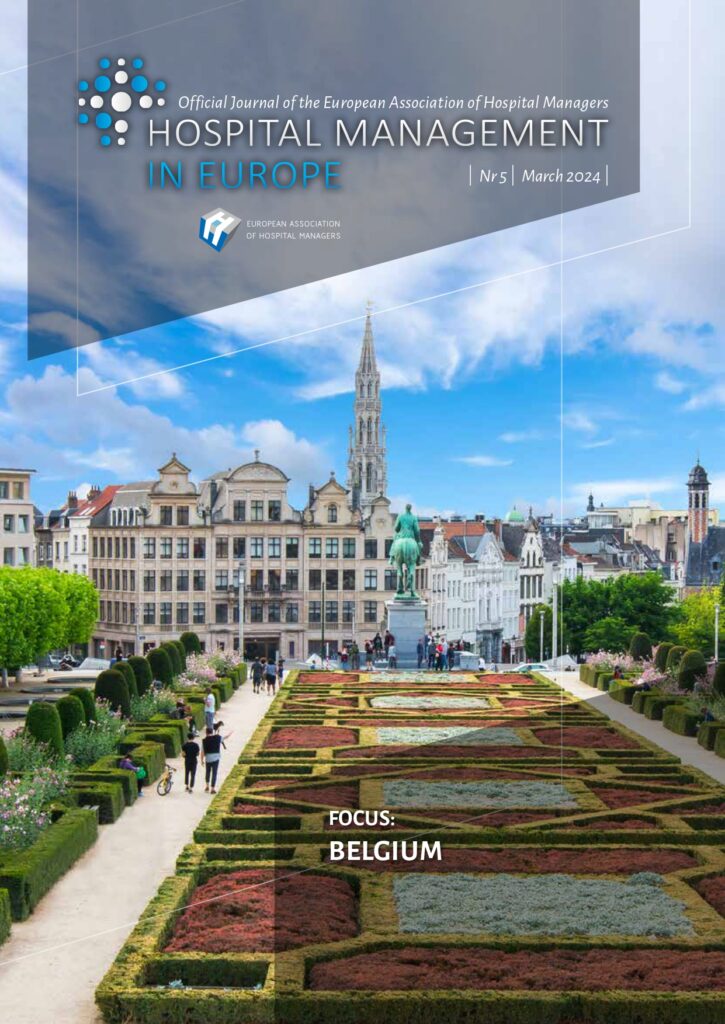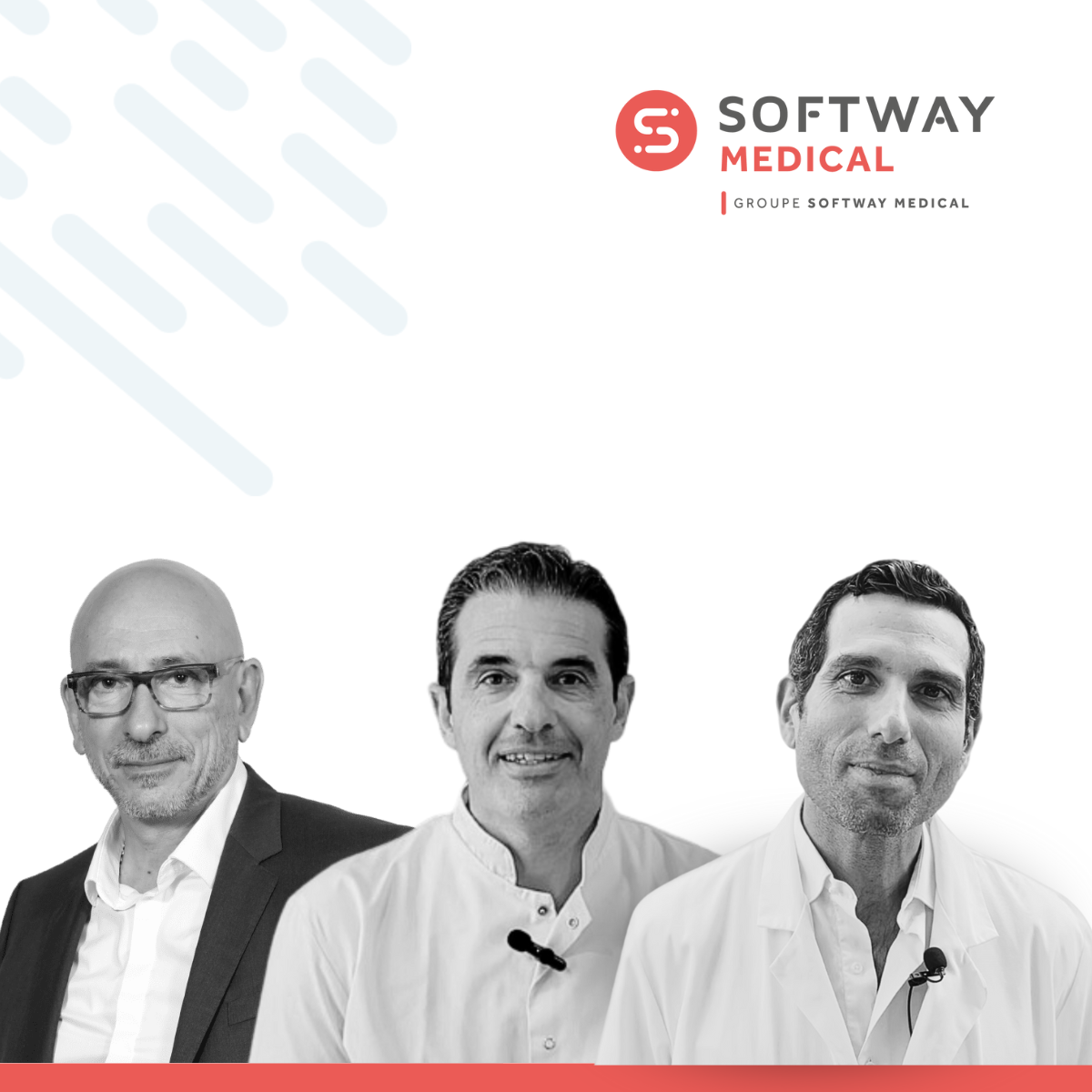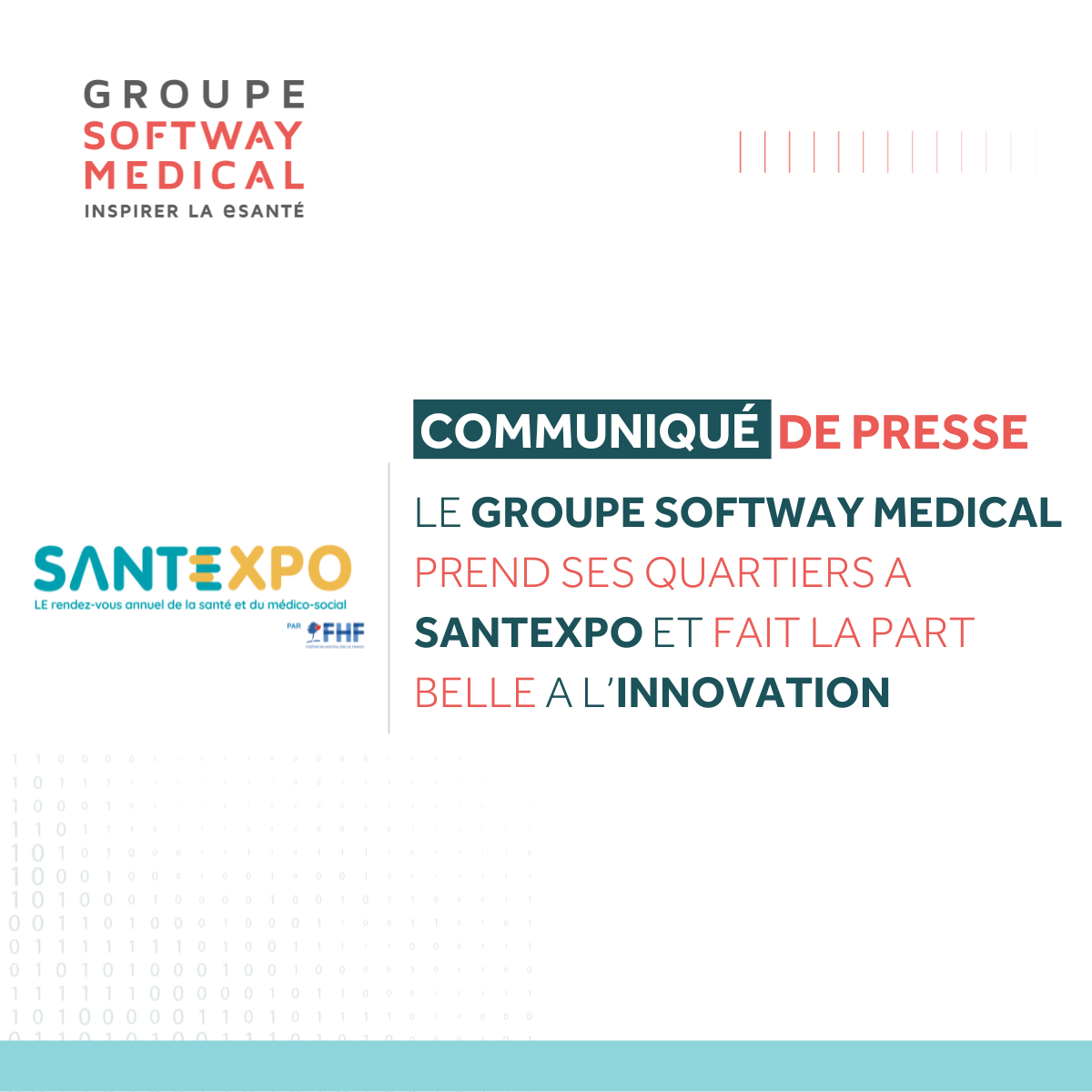Softway Medical on course to conquer the European Healthcare software market
THE MAGAZINE OF European Association of Hospital Managers, EAHM, LOOKS BACK AT SOFTWAY MEDICAL’S HYPERGROWTH IN AN EXCLUSIVE INTERVIEW.
EAHM is one of the world’s largest hospital management associations. It represents both public and private hospital managers in the European Union and internationally.
The March 2024 issue features an exclusive interview with Sherley Brothier, CTO of the Softway Medical Group, and Jean-Baptiste Franceschini, Marketing Communication and International Development Director, on the Group’s innovations as a leader in healthcare information systems. Read the article on pages 14 & 15, right here.

Softway Medical out to conquer Europe’s healthcare software market
After an outstanding 2022, Softway Medical has consolidated that progress in 2023. Top of the latest rankings compiled by international firm KLAS Research, the French software publisher is now generating interest from its European neighbours. This unique business model of publisher, integrator and hosting provider, having proved its worth in France, is now setting out to conquer Europe, armed with its many strengths and inspiring vision of e-health. Joint interview with Sherley Brothier, Softway Medical Group’s CTO, and Jean-Baptiste Franceschini, CMO and head of international development.
Softway Medical has this year climbed to the top of the podium in the KLAS Research rankings. What can you tell us about that?
Jean-Baptiste Franceschini : Softway Medical made an eye-catching entry into those rankings in
2022. Absent up to then, the firm jumped straight into second place after capturing market share in the EPR (electronic patient records) segment in Europe over the 2016-2018 period. This breakthrough was confirmed in the following period (2018-2022), making Softway Medical now the front-runner as the publisher having won the most new clients in Europe, with over 250 new hospitals. What is even more striking is that we are operating with just one product, the Hospital Manager healthcare ERP, and 95% of it on the French market over this period. The other big names’ position is one of consolidating their growth by acquisition and their sometimes competing offerings, whereas our growth is purely organic and is now becoming visible outside Europe.
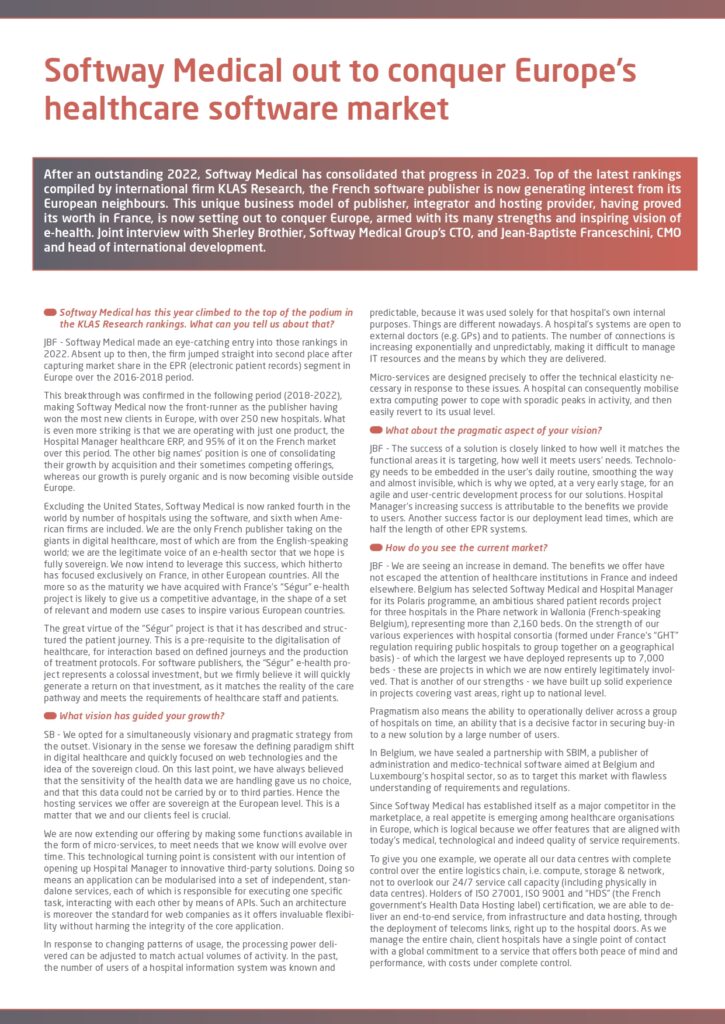 Excluding the United States, Softway Medical is now ranked fourth in the world by number of hospitals using the software, and sixth when American firms are included. We are the only French publisher taking on the giants in digital healthcare, most of which are from the English-speaking world; we are the legitimate voice of an e-health sector that we hope is fully sovereign. We now intend to leverage this success, which hitherto has focused exclusively on France, in other European countries. All the more so as the maturity we have acquired with France’s “Ségur” e-health project is likely to give us a competitive advantage, in the shape of a set of relevant and modern use cases to inspire various European countries.
Excluding the United States, Softway Medical is now ranked fourth in the world by number of hospitals using the software, and sixth when American firms are included. We are the only French publisher taking on the giants in digital healthcare, most of which are from the English-speaking world; we are the legitimate voice of an e-health sector that we hope is fully sovereign. We now intend to leverage this success, which hitherto has focused exclusively on France, in other European countries. All the more so as the maturity we have acquired with France’s “Ségur” e-health project is likely to give us a competitive advantage, in the shape of a set of relevant and modern use cases to inspire various European countries.
The great virtue of the “Ségur” project is that it has described and structured the patient journey. This is a pre-requisite to the digitalisation of healthcare, for interaction based on defined journeys and the production of treatment protocols. For software publishers, the “Ségur” e-health project represents a colossal investment, but we firmly believe it will quickly generate a return on that investment, as it matches the reality of the care pathway and meets the requirements of healthcare staff and patients.
What vision has guided your growth?
Sherley Brothier : We opted for a simultaneously visionary and pragmatic strategy from the outset. Visionary in the sense we foresaw the defining paradigm shift in digital healthcare and quickly focused on web technologies and the idea of the sovereign cloud. On this last point, we have always believed that the sensitivity of the health data we are handling gave us no choice, and that this data could not be carried by or to third parties. Hence the hosting services we offer are sovereign at the European level. This is a matter that we and our clients feel is crucial. We are now extending our offering by making some functions available in the form of micro-services, to meet needs that we know will evolve over time. This technological turning point is consistent with our intention of opening up Hospital Manager to innovative third-party solutions. Doing so means an application can be modularised into a set of independent, standalone services, each of which is responsible for executing one specific task, interacting with each other by means of APIs. Such an architecture is moreover the standard for web companies as it offers invaluable flexibility without harming the integrity of the core application.
In response to changing patterns of usage, the processing power delivered can be adjusted to match actual volumes of activity. In the past, the number of users of a hospital information system was known and predictable, because it was used solely for that hospital’s own internal purposes. Things are different nowadays. A hospital’s systems are open to external doctors (e.g. GPs) and to patients. The number of connections is increasing exponentially and unpredictably, making it difficult to manage IT resources and the means by which they are delivered. Micro-services are designed precisely to offer the technical elasticity necessary in response to these issues. A hospital can consequently mobilise extra computing power to cope with sporadic peaks in activity, and then easily revert to its usual level.
What about the pragmatic aspect of your vision?
Jean-Baptiste Franceschini : The success of a solution is closely linked to how well it matches the functional areas it is targeting, how well it meets users’ needs. Technology needs to be embedded in the user’s daily routine, smoothing the way and almost invisible, which is why we opted, at a very early stage, for an agile and user-centric development process for our solutions. Hospital Manager’s increasing success is attributable to the benefits we provide to users. Another success factor is our deployment lead times, which are half the length of other EPR systems.
How do you see the current market?
Jean-Baptiste Franceschini : We are seeing an increase in demand. The benefits we offer have
not escaped the attention of healthcare institutions in France and indeed elsewhere. Belgium has selected Softway Medical and Hospital Manager for its Polaris programme, an ambitious shared patient records project for three hospitals in the Phare network in Wallonia (French-speaking Belgium), representing more than 2,160 beds. On the strength of our various experiences with hospital consortia (formed under France’s “GHT” regulation requiring public hospitals to group together on a geographical basis) – of which the largest we have deployed represents up to 7,000 beds – these are projects in which we are now entirely legitimately involved. That is another of our strengths – we have built up solid experience
in projects covering vast areas, right up to national level.
Pragmatism also means the ability to operationally deliver across a group of hospitals on time, an ability that is a decisive factor in securing buy-into a new solution by a large number of users.
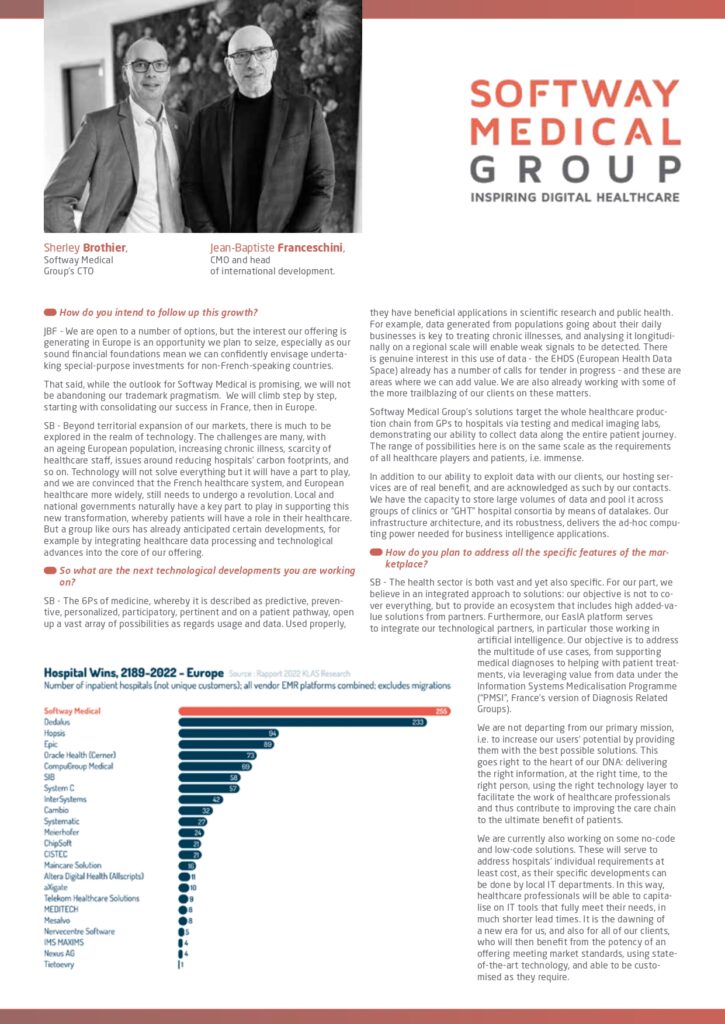 In Belgium, we have sealed a partnership with SBIM, a publisher of
In Belgium, we have sealed a partnership with SBIM, a publisher of
administration and medico-technical software aimed at Belgium and
Luxembourg’s hospital sector, so as to target this market with flawless
understanding of requirements and regulations.
Since Softway Medical has established itself as a major competitor in the marketplace, a real appetite is emerging among healthcare organisations in Europe, which is logical because we offer features that are aligned with today’s medical, technological and indeed quality of service requirements.
To give you one example, we operate all our data centres with complete control over the entire logistics chain, i.e. compute, storage & network, not to overlook our 24/7 service call capacity (including physically in data centres). Holders of ISO 27001, ISO 9001 and “HDS” (the French government’s Health Data Hosting label) certification, we are able to deliver an end-to-end service, from infrastructure and data hosting, through the deployment of telecoms links, right up to the hospital doors. As we manage the entire chain, client hospitals have a single point of contact with a global commitment to a service that offers both peace of mind and performance, with costs under complete control.
How do you intend to follow up this growth?
Jean-Baptiste Franceschini : We are open to a number of options, but the interest our offering is generating in Europe is an opportunity we plan to seize, especially as our sound financial foundations mean we can confidently envisage undertaking special-purpose investments for non-French-speaking countries.
That said, while the outlook for Softway Medical is promising, we will not be abandoning our trademark pragmatism. We will climb step by step, starting with consolidating our success in France, then in Europe.
Sherley Brothier : Beyond territorial expansion of our markets, there is much to be explored in the realm of technology. The challenges are many, with an ageing European population, increasing chronic illness, scarcity of healthcare staff, issues around reducing hospitals’ carbon footprints, and so on. Technology will not solve everything but it will have a part to play, and we are convinced that the French healthcare system, and European healthcare more widely, still needs to undergo a revolution. Local and national governments naturally have a key part to play in supporting this new transformation, whereby patients will have a role in their healthcare.
But a group like ours has already anticipated certain developments, for example by integrating healthcare data processing and technological advances into the core of our offering.
So what are the next technological developments you are working on?
Sherley Brothier : The 6Ps of medicine, whereby it is described as predictive, preventive, personalized, participatory, pertinent and on a patient pathway, open up a vast array of possibilities as regards usage and data. Used properly, they have beneficial applications in scientific research and public health.
For example, data generated from populations going about their daily businesses is key to treating chronic illnesses, and analysing it longitudinally on a regional scale will enable weak signals to be detected. There is genuine interest in this use of data – the EHDS (European Health Data Space) already has a number of calls for tender in progress – and these are areas where we can add value. We are also already working with some of the more trailblazing of our clients on these matters.
Softway Medical Group’s solutions target the whole healthcare production chain from GPs to hospitals via testing and medical imaging labs, demonstrating our ability to collect data along the entire patient journey. The range of possibilities here is on the same scale as the requirements of all healthcare players and patients, i.e. immense.
In addition to our ability to exploit data with our clients, our hosting services are of real benefit, and are acknowledged as such by our contacts. We have the capacity to store large volumes of data and pool it across groups of clinics or “GHT” hospital consortia by means of datalakes. Our infrastructure architecture, and its robustness, delivers the ad-hoc computing power needed for business intelligence applications.
How do you plan to address all the specific features of the marketplace?
Sherley Brothier : The health sector is both vast and yet also specific. For our part, we believe in an integrated approach to solutions: our objective is not to cover everything, but to provide an ecosystem that includes high added-value solutions from partners. Furthermore, our EasIA platform serves to integrate our technological partners, in particular those working in artificial intelligence. Our objective is to address the multitude of use cases, from supporting medical diagnoses to helping with patient treatments, via leveraging value from data under the Information Systems Medicalisation Programme
(“PMSI”, France’s version of Diagnosis Related Groups).
We are not departing from our primary mission, i.e. to increase our users’ potential by providing
them with the best possible solutions. This goes right to the heart of our DNA: delivering the right information, at the right time, to the right person, using the right technology layer to facilitate the work of healthcare professionals and thus contribute to improving the care chain to the ultimate benefit of patients.
We are currently also working on some no-code and low-code solutions. These will serve to address hospitals’ individual requirements at least cost, as their specific developments can be done by local IT departments. In this way, healthcare professionals will be able to capitalise on IT tools that fully meet their needs, in much shorter lead times. It is the dawning of a new era for us, and also for all of our clients,
who will then benefit from the potency of an offering meeting market standards, using state of- the-art technology, and able to be customised as they require.

